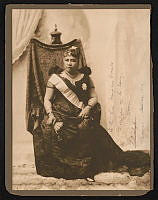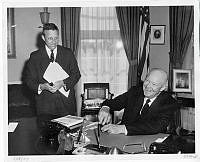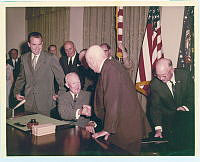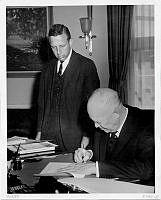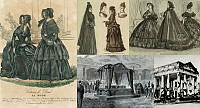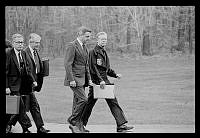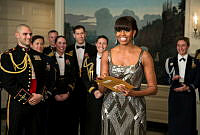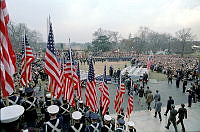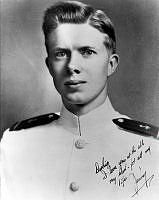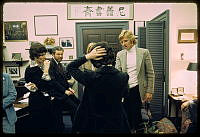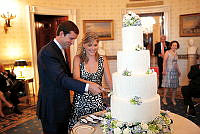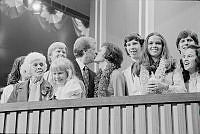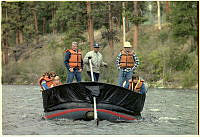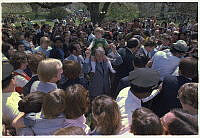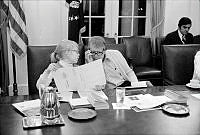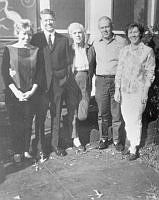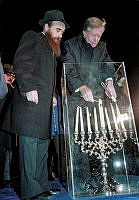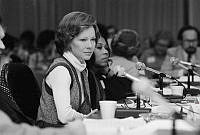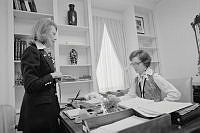Benjamin Harrison
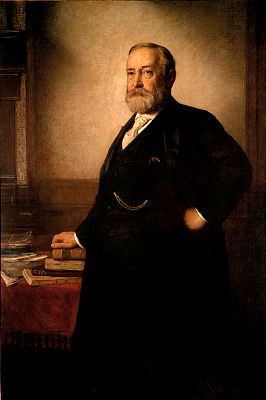
Nominated for president on the eighth ballot at the 1888 Republican convention, Benjamin Harrison conducted one of the first "front-porch" campaigns, delivering short speeches to delegates that visited him in Indianapolis. As he was only 5 feet, 6 inches tall, Democrats called him "Little Ben"; Republicans replied he was big enough to wear the hat of his grandfather, "Old Tippecanoe."
Born on August 20, 1833 on a farm by the Ohio River west of Cincinnati, Harrison attended Miami University in Ohio and read law in Cincinnati. He moved to Indianapolis, where he practiced law and campaigned for the Republican Party. He married Caroline Lavinia Scott in 1853 and they had two children together. After the Civil War — he served in the 70th Regiment of Indiana Volunteers and rose to the rank of brigadier general — Harrison became a pillar of Indianapolis, enhancing his reputation as a brilliant lawyer.
The Democrats defeated him for governor of Ohio in 1876 by ridiculing him as "Kid Gloves" Harrison. In the 1880s, he represented Indiana in the United States Senate, where he advocated for protective tariffs, conservation of western lands, and pensions for Civil War veterans. He also opposed supporting legislation to exclude Chinese immigrants from entering the United States.
In the 1888 presidential election, Harrison received about 90,000 fewer popular votes than Cleveland, but carried the Electoral College 233 to 168. Although Harrison had made no political bargains, his supporters had given innumerable pledges upon his behalf.
Harrison was proud of the vigorous foreign policy that he helped shape. The first Pan-American Conference met in Washington in 1889, establishing an information center that later became the Pan-American Union. Harrison also negotiated a series of trade agreements, believing that reciprocity between friendly nations would generate economic growth and foster diplomatic relations. At the end of his administration, Harrison submitted to the Senate a treaty to annex Hawaii; to his disappointment, President Cleveland later withdrew it.
Substantial appropriation bills were signed by Harrison for internal improvements, naval expansion, and subsidies for steamship lines. For the first time except in war, Congress appropriated a billion dollars. When critics attacked the "billion-dollar Congress," Speaker Thomas B. Reed replied, "This is a billion-dollar country." President Harrison also signed the Sherman Anti-Trust Act "to protect trade and commerce against unlawful restraints and monopolies," the first federal act attempting to regulate trusts.
The most perplexing domestic problem Harrison faced was the tariff issue. The high tariff rates in effect had created a surplus of money in the Treasury. Low-tariff advocates argued that the surplus was hurting business. Republican leaders in Congress successfully met the challenge. Representative William McKinley and Senator Nelson Aldrich framed a still higher tariff bill; some rates were intentionally prohibitive. Harrison tried to make the tariff more acceptable by writing in reciprocity provisions. To cope with the Treasury surplus, the tariff was removed from imported raw sugar; sugar growers within the United States were given two cents a pound bounty on their production.
Harrison endorsed two bills designed to protect civil rights for African Americans, and vigorously enforced the 15th Amendment—the right to vote. He also appointed Frederick Douglass to serve as the U.S. Minister to Haiti, and relied on his counsel frequently.
Long before the end of Harrison's term, the Treasury surplus had evaporated, and prosperity seemed about to disappear as well. Congressional elections in 1890 went stingingly against the Republicans, and party leaders began to distance themselves from President Harrison although he had cooperated with Congress on party legislation. Nevertheless, his party renominated him in 1892, but he was defeated by Grover Cleveland. Just two weeks before the 1892 election, First Lady Caroline Harrison died of tuberculosis. For the remainder of his term, their daughter, Mary, served as White House hostess. After leaving office, Harrison returned to Indianapolis, and later married his deceased wife's niece, Mary Dimmick, in 1896. He died on March 13, 1901.













